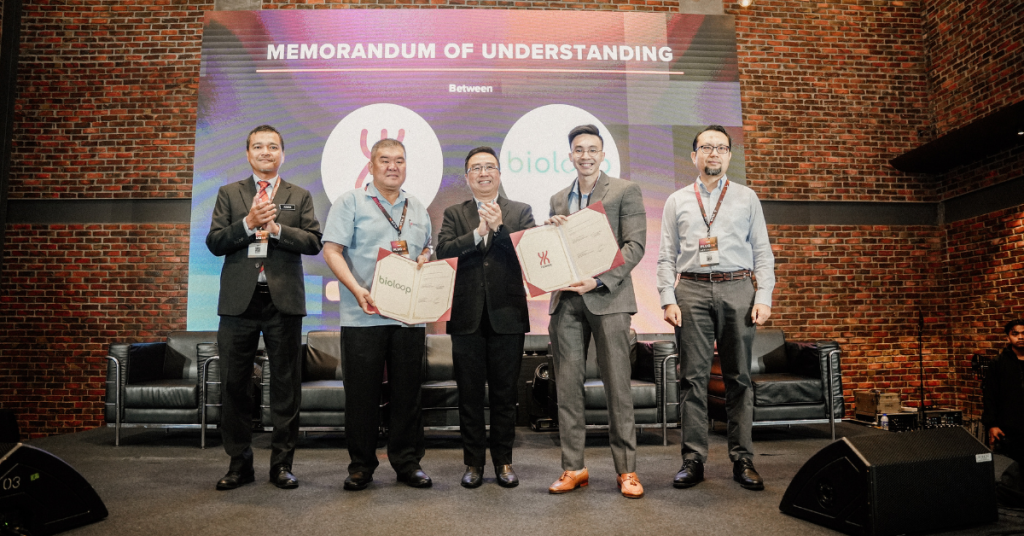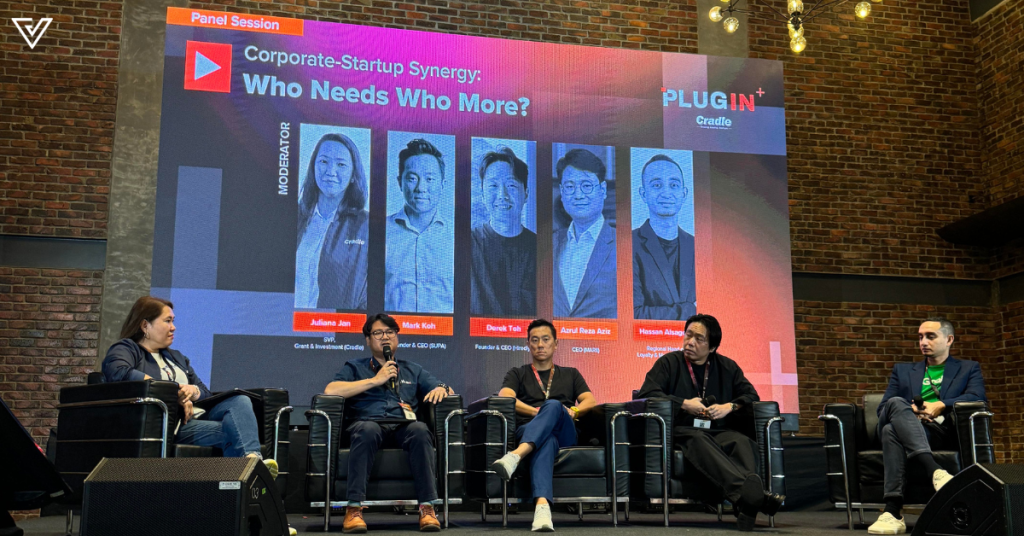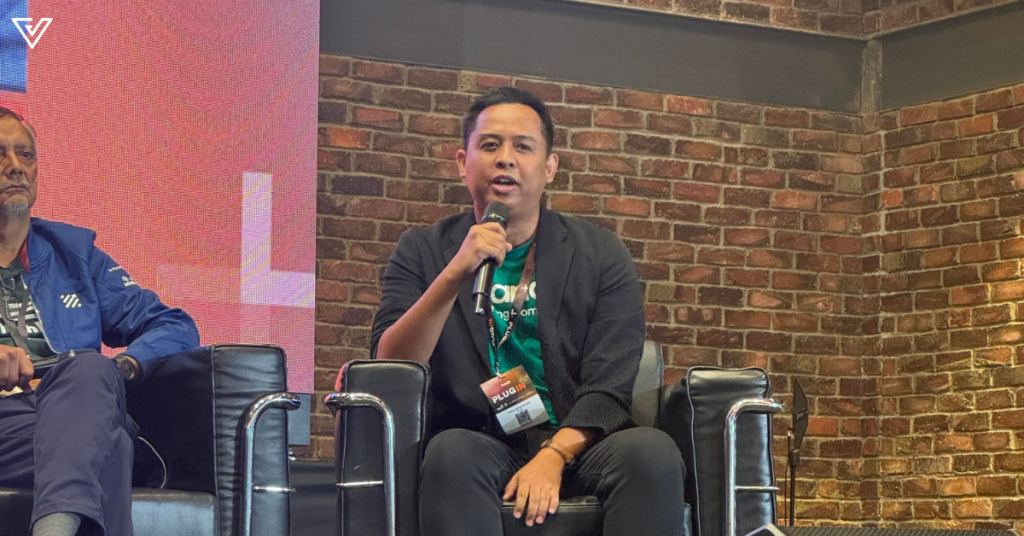[Written in partnership with Cradle, but the editorial team had full control over the content.]
Looking back at 2024, there have no doubt been many insightful conferences and events in the startup and business world.
From the iconic KL20 Summit to the recent Startup Week Malaysia, there have been many learnings to go around.
At this point, though, you might be feeling burnt out on full-fledged conferences and large-scale events. Thankfully, Cradle’s recent and inaugural PLUGIN conference felt like a cosy and intimate gathering, albeit one that brought in lots of great startups, investors, and policymakers.

The event even saw an Memorandum of Understanding (MoU) signing by homegrown biotech company Bioloop and Yenher Holdings, as witnessed by Yang Berhormat Tuan Chang Lih Kang, our Minister of Science, Technology & Innovation Malaysia (MOSTI).
If you weren’t able to make it, here were some of the highlights from the one-day event.
1. If you want to work with a corporate, you must have a “champion” on the inside
The first panel of the day had been all about corporate-startup synergy. Panellists included both startups as well as corporates to attest to both sides of the equation.
Namely, the panel included Mark Koh from SUPA, Derek Toh of Hiredly, Azrul Reza Aziz from MARII, and Hassan Alsagoof from Grab. The conversation was moderated by Cradle’s very own Juliana Jan.
One thing that the speakers agreed upon was the importance of having a “champion” or “sponsor” on the corporate side of things.

This refers to someone who strives to understand your startup, digests that information, and then communicates that to other decision makers in the corporate team. It’s someone who will continually speak up for you and connect you with the corporate.
When your champion is a C-suite level executive, then you’re golden, as many decisions in the corporate world are very top-down.
But that doesn’t mean you’re screwed if you don’t have access to the C-level. You just need to identify someone who has the capacity to help you, and engage with them frequently.
2. Having good endurance and a good runway is key for startups
This might sound like a given, but it’s extremely true especially when you’re aiming to work with bigger companies.
As you may know, bigger corporations take a long time to make decisions. Confidence also takes time to build with them, as they’re all about mitigating risks.
This means that at the end of the day, you must be in it for the long run, and you cannot be relying on the corporate angle working out.
Startups must consider any corporate handouts as a bonus instead of banking on it, and instead focus on properly running your business. In other words, the Business As Usual (BAU) elements must be down pat.
3. More than financial support, grants will teach you accountability
In case you didn’t know, a grant isn’t necessarily just free money. Well, it’s true that in a way it’s free money since it’s not tied up with any equity or stake in the company, it’s something you have to work hard to earn—and harder yet to keep.
During the second panel that was focused on grants and incubators, Pandai founder and CEO Khairul Anwar shared how grants are given out on a milestone basis. Basically, startups don’t get the bulk of the money in a lump sum, but rather, it’s usually on a quarterly sort of basis.

There’s also a lot of compliance matters. Meaning to say, you cannot use that grant money to pay yourself or your staff.
Rather, it’s earmarked for specific tasks, and you cannot perform those tasks yourself even if you’re skilled in it. For instance, the Pandai team could do web development on their own, but to utilise the grant, they needed to hire a third-party developer.
While this might seem like something tedious, the silver lining is that it teaches startups to be very accountable and compliant, gearing them up for future success.
So, keep that in mind before you apply for a grant, and try to look to the positive sides when learning how to navigate all the paperwork and red tape involved.
4. Governance is key as you grow your startup
Perhaps something that might be overlooked in the “ESG” trifecta is the “G”—governance.
Similar to the last point about grants, there’s actually a lot of regulations that startups have to navigate, especially as they grow.
Startups typically have a more “cowboy” way of doing things, but ultimately, there are a lot of guidelines they must follow, especially if you want to play in the big leagues. Thus, paying attention to governance from the get-go can help set a business up for success.
During the panel on IPOs and acquisitions in Malaysia, Elaine Lockman, the CEO & Co-Founder of Ata Plus, shared that governance is key during exits. Startups will need to have a lot of information on hand to meet certain criteria.

Look at the whole shebang that WeWork went through back in 2019 as it was filing for IPO. That just goes to show how bad governance will lead to a whole business’ demise.
During the conference, we also heard from legal experts in the Cradle team that a key reason why startups fail is actually due to governance issues. Based on their data, there’s one of three reasons that startups flounder, and that’s either from shareholder disputes, having no proper structure, or no proper bookkeeping.
So, if you’re running a startup and think that you can just do whatever you want until you grow bigger, think again.
5. It comes down to basic business sense
One big theme that we noticed during the conference was the emphasis on basic business fundamentals.
As pinpointed during the final panel of the day, which touched on venture capital in Malaysia, it all comes down to dollars and cents.
In the context of Asia especially, the Silicon Valley playbook doesn’t quite work. Investors like to see a more traditional approach whereby the unit economics simply make sense.

Yes, this might mean that regional startups might have a harder time getting off the ground, but it also means that they are more sustainable and have better endurance.
So, really, it’s all about running a business, and running it well. Have the stamina to see things through, and do things by the book. While these pieces of advice might not seem sexy, they’re necessary.
An optimistic future for Malaysia
Ever since the KL20 summit, or maybe even before, there has been a sense of optimism for the Malaysian market. Our currency has been performing rather strongly, and Bursa Malaysia is also looking good.
It comes down to several factors, one of which is the political stability that we’ve been experiencing. There have been so many roadmaps and policies that have come into play this year, and we cannot wait to see them actually come into fruition.

So for all the startup founders out there reading this, be sure to equip yourself with these pearls of wisdom. As they say, opportunities come to those who are prepared.
And with those opportunities, accolades may follow. In conjunction with the conference, there was the PLUGIN Award Dinner Night. Here are the startups that were recognised and awarded:
- Trailblazer Cradle Startup of the Year: Debit Circles (Vircle), founded by Gokula Krishnan Subramaniam
- Disruptor of the Year: The Smarter Solution Edge (Voice for Health), founded by Chua Sern Teen
- Rising Star Award: Evolving Briliance (EB Tech), founded by Ashween A/L Narayanan
- Founder to Watch: Shermaine Wong Xi Mun of Cult Creative
- Investor Magent: Polisea (PolicyStreet), founded by Wilson Beh
- Cradle All Star: Niagawan Plus, founded by Bryant Gan
We wish a hearty congratulations to the awarded names, and can’t wait to see what they—along with other nominees and fellow startups—continue to do in the coming year.
- Learn more about Cradle here.
- Read other articles we’ve written about Cradle here.
Also Read: Malaysia’s semiconductor industry is ramping up, here are the companies that are hiring now
Featured Image Credit: Cradle

